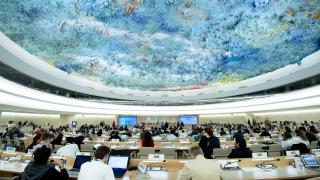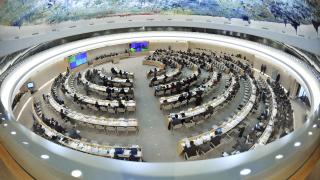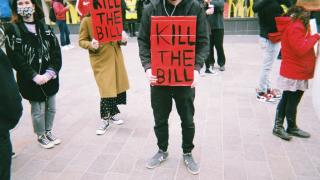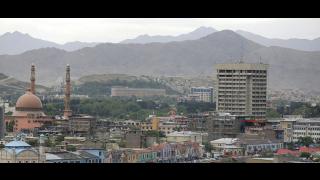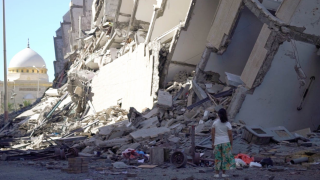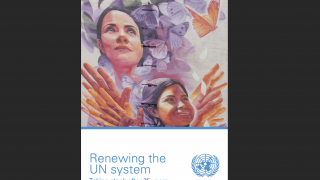
In Human Rights Council (HRC) resolution 25/22, adopted earlier this year, states were asked to share their views on a number of legal ambiguities identified by Special Rapporteur Ben Emmerson relating to the use of armed drones. The UK has failed to respond to this request, which was designed to build international consensus over the use of these weapons.
On Monday 22 September, during an interactive HRC panel discussion, experts including Special Rapporteurs Ben Emmerson and Christof Heyns agreed on the need for greater transparency and accountability, and for effective implementation of existing international laws, with regard to the use of armed drones. Rather than engaging on the substance on the discussion, the UK, as it has done in the past, expressed the view that the HRC is not the appropriate forum for these discussions. In a report released in June, UNA-UK called on the UK to engage constructively with the HRC on this issue.
Despite having previously voted against holding the panel discussion, in its statement, the UK accepted the decision to hold the event but stated that it did not believe the HRC should take up particular weapons “on a thematic basis”. The rationale for the UK's (and others, including the US's) refusal to engage on this issue at the HRC was challenged by both Special Rapporteurs. Ben Emmerson, rapporteur on counter terrorism and human rights, expressed that, in armed conflict, the duty to investigate is “classic human rights law territory”.
Ahead of the panel discussion, Sir Jeremy Greenstock, UNA-UK Chairman, Lord Hannay, Chair of the UN APPG, Tom Watson MP, Chair of the Drones APPG, and a number of other prominent UK figures, wrote to members of the expert panel to express the view that, in the absence of adequate state responses, definitive recommendations from a Special Procedures mandate-holder are urgently needed to address the questions posed by Ben Emmerson in resolution 25/22. The authors of the letter agreed that the issue is "all the more pertinent and timely as the frontiers of transnational counter-terrorism operations expand: increased use of armed drones underscores the need for greater consensus between states on how to apply the international laws that regulate lethal force."
The full text of the letter, which was picked up by the Guardian newspaper, is available below.
We are writing to you in advance of the Panel Discussion scheduled for 22 September, pursuant to UN Human Rights Council ('the Council') resolution 25/22. We view resolution 25/22 and the expert Panel discussion, part of the Council’s 27th session, as important steps in its work to protect the human rights of those affected by armed drones around the world.
In resolution 25/22, the Council called on States to ensure that any measures employed to counter terrorism, including the use of remotely piloted aircraft or armed drones, comply with their obligations under existing international law. The Council further called on States to conduct prompt and independent investigations whenever there are indications of a violation of international law caused by their use. We welcome the lead of the Council in this regard. Resolution 25/22 is made all the more pertinent and timely as the frontiers of transnational counter-terrorism operations expand: increased use of armed drones underscores the need for greater consensus between States on how to apply the international laws that regulate lethal force.
We note, in particular, that States are invited to respond to the questions posed by Special Rapporteur Ben Emmerson in his report of 28 February prior to the 27th session of the Human Rights Council. We note that the 27th session has now commenced and the UK Government does not appear to have responded to the Special Rapporteur.
In the event that the UK Government or other States do not respond, or do not respond adequately, to the questions posed at paragraph 71 of the Special Rapporteur's report of 28 February, we urge you to consider the advantages of having a Special Procedures mandate-holder address these questions in a new report. We consider the Panel on 22 September well placed to encourage this approach, in order to follow up on Council resolution 25/22 and General Assembly Reports A/65/321 and A/68/382. We note that Mr Emmerson's existing mandate, extended by resolution 22/8 on 21 March 2013, includes a request from the Council 'to make recommendations on the promotion and protection of human rights and fundamental freedoms while countering terrorism’.
In our view, in the absence of consensus on this issue, States urgently need definitive recommendations (‘UN Guidance') from a Special Procedures mandate-holder to address the questions posed at paragraph 71. We recommend that this should, in turn, form the basis for a further Council resolution on the core principles governing use of armed drones.
We would welcome the continued lead of the Special Procedures and Panel in considering such positive action next Monday.Yours Sincerely,
Sir Jeremy Greenstock, Chair, United Nations Association – UK
Lord Hannay, Chair, UN APPG
Tom Watson MP, Chair, Drones APPG
Baroness Stern, Vice-Chair Drones APPG
Admiral Lord West of Spithead, member, Drones APPG
John Hemming MP, Officer, Drones APPG
David Anderson MP, Officer, Drones APPG
Zac Goldsmith MP, Vice-Chair Drones APPG
UNA-UK has consistently called on the UK to engage fully with UN initiatives to build international consensus on armed drone use and to respond fully to UN calls for public explanations regarding drone strikes that have led to civilian casualties.
More information on UNA-UK's work on armed drones can be found in our foreign policy manifesto: 'A global force for good: Ten ideas for UK foreign policy'

